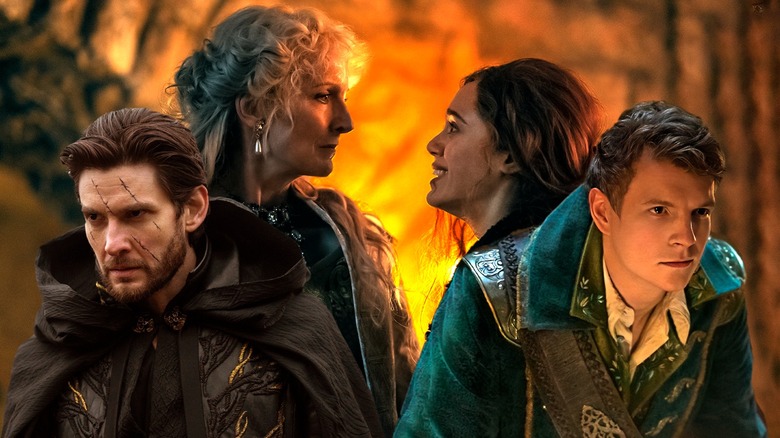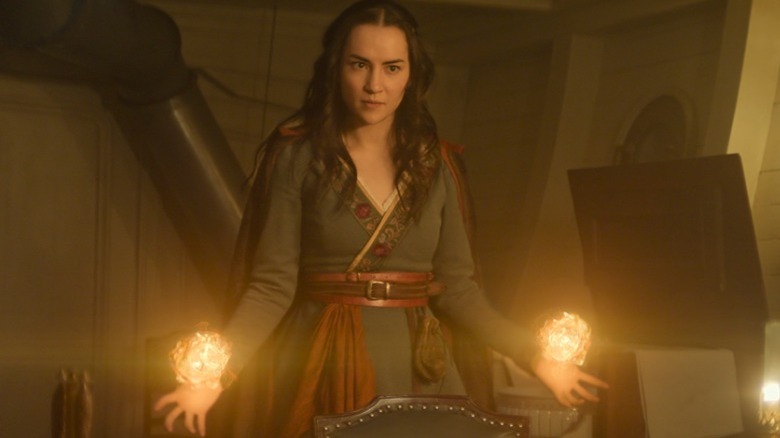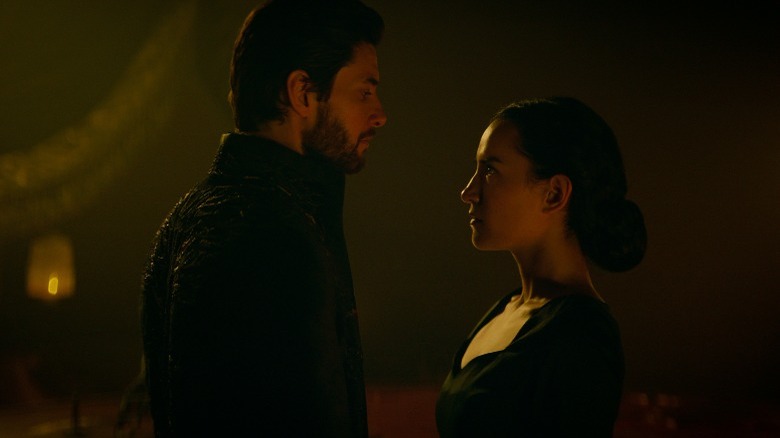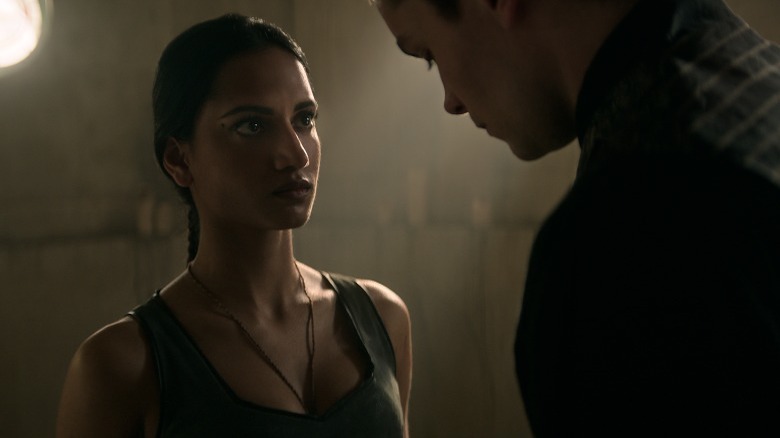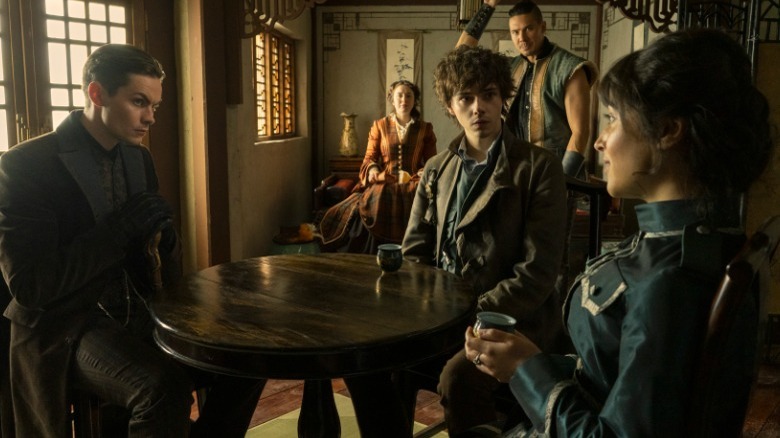How Netflix's Shadow And Bone Season 2 Revitalizes Tired Fantasy Tropes
This post contains spoilers for season 2 of Netflix's "Shadow and Bone."
Fantasy, as a genre, brims with standard tropes refashioned to suit the tone and depth of respective narratives, wherein some stories dare to soar higher than baseline expectations. While such tropes can be retrofitted into thrilling, compelling stories, the genre often finds itself plagued with hackneyed executions of the chosen one, deliberate slow-burns that are often infuriating, and interpersonal dynamics that look like Wattpad fanfictions come to life.
However, the moment fantasy tales ground their characters with convincing motivations, true magic happens. For that, one need look no further than Andrzej Sapkowski's "The Witcher" saga, which revolves around a morally-complex hero and a child of prophecy who grapples with the weight of her purpose. Leigh Bardugo's YA Grishaverse novel series, which includes the "Shadow and Bone" trilogy and the "Six of Crows" duology among others, manages to accomplish something similar by using tired genre tropes in its favor to create a dazzling interconnected web of stories.
The Netflix adaptation of Bardugo's novels, "Shadow and Bone" succeeds in bringing such a complex, colorful world to life, and the show's latest season is proof that tired fantasy tropes can, in fact, heighten stakes when invested with thoughtful writing and meaningful depth. While season 2 makes significant departures from the books, the show innately understands Bardugo's Grishaverse and what makes it so interesting, including the subtle subversion of standard tropes to etch powerful characters journeying toward their inevitable ends. For instance, Sun Summoner Alina Starkov (Jessie Mei Li) ventures beyond the trope of the chosen one: Although she traverses checkpoints that this mantle commonly demands, she stands out because of her grounded humanity, as opposed to the miraculous powers that are a part of who she truly is.
The chosen one
From Frodo Baggins to Anakin Skywalker, many protagonists have walked the path of The Chosen One with variable stakes, and outcomes. While some choose to walk the path, others are forced to assume this weight of impossible expectations, which almost always leads to the fate of their worlds resting on their shoulders. Alina Starkov is no different. Growing up as an orphan to become a mapmaker for the First Army, Alina spends most of her life feeling perennially overlooked, until she is noticed by the Darkling (Ben Barnes) after she displays a rare, miraculous power. Not only does she turn out to be Grisha, but also the Sun Summoner, with the potential to destroy the Shadow Fold that grows like a festering wound between Ravka and the rest of the world.
In Season 2, Alina finally steps into her power with the understanding that her journey requires dogged determination and an unflinching belief in herself. Despite possessing these heroic qualities, she is not immune to missteps; at several points, she is in denial of her connection with Kirigan and finds herself sidetracked by her single-minded focus on coveting Amplifiers. This is part of the reason why she and Mal (Archie Renaux) grow apart for some time, with Mal struggling to grapple Alina's role as a symbol of hope for Ravka. For Mal, Alina is the girl he grew up with in the orphanage, his sense of home, and the woman he will do anything to protect. Although Alina reciprocates, she is burdened by a horrible responsibility that she believes can only be shouldered by her alone. This is when she is proven wrong, as she witnesses the beauty of power shared among allies ready to rally behind her cause. However, sainthood comes at a personal cost.
Enemies to lovers (reversed)
The first season of "Shadow and Bone" introduced the epic Alina x Kirigan dynamic, which started off begrudgingly, only to evolve into a passionate love affair that ends in betrayal. This lovers-to-enemies arc is not only meaningful to the central narrative but also informs who the Darkling and Alina are as people. While Alina approaches Kirigan with an open heart, the latter views her as a shiny object to amplify his powers, and by extension, his ego. This concealed incel-like sensibility is completely unmasked in season 2, where Kirigan attempts to shamelessly manipulate Alina again, believing that his lies and empty promises can lure her back into his web. Alina, of course, isn't so easily swayed, but she struggles to shed his hold on her, manifested literally by the amplifier-shard that ties them together.
The enemies-to-lovers trope can be immensely satisfying when executed with skill and nuance, but to nail a reversal requires adequate depth and sensitive handling of character motivations. Yes, the Darkling is a power-hungry manipulator who has spent a hundred years using Grisha to fill the void, but he is also terribly wounded and trapped by the reality of losing everyone he has loved over the years. While this understanding does not redeem him in any way, it sheds light on the reason why he is consumed by the need to covet Alina, the literal antithesis of what he stands for.
Kirigan clings to the misguided hope that Alina's light will rub off on him, along with the egotistic glee of plunging a person like her into the darkest shadows. While the "if I can't have her, no one else can" trope can easily veer into icky territory, the show manages to add depth to this problematic human impulse in a nuanced manner.
A doomed, almost-impossible romance
Although season 2 has only managed to widen the gulf between Nina (Danielle Galligan) and Matthias (Calaghan Skogman), their dynamic mimics the star-crossed lovers trope, where their different worlds collide in the most surprising ways. Fantasy is no stranger to doomed, borderline "forbidden" romances, where, for instance, a vampire and a vampire-hunter fall for each other, with several variations of this dynamic between hunter and hunted. Nina, a Heartrender, is prey for the likes of Matthias, a drüskelle from Fjerda trained to hunt and kill Grisha since birth. As expected, tempers fly after the two meet, but the two are able to meet halfway after overcoming massive odds, only to be wrenched apart due to a fundamental misunderstanding. Despite following the basic beats of this standard trope, Nina x Matthias embodies the hope that generational hatred/conflict can be overcome with love, however cheesy that sounds. The bottom line: it works.
However, the epitome of a doomed romance is undoubtedly Kaz (Freddy Carter) and Inej (Amita Suman), two individuals bogged down by their trauma to the point they cannot even openly articulate what they feel for one another. As Crows, they shared mutual respect and camaraderie, but their circumstances limit any space for emotional vulnerability, which has a dear cost in this world. Season 2 pushes the envelope in terms of Kaz's need to avenge his brother, while Inej wants to be free of her indentured contract. While they achieve these things, it is enough — while Kaz's trauma hinders him from experiencing physical or emotional intimacy, Inej is painfully aware that hope is a dangerous thing, portrayed viscerally when the Crows are incapacitated by a poison gas that induces vivid hallucinations. While Kanej burns with the curse of an impossible union, we burn with them.
Found family
The crux of "Shadow and Bone" is found family — be it Alina finally feeling at home amid the Grisha or the Crows forging close bonds while pulling off dangerous little missions together — and this trope is perhaps the show's greatest strength. The latest season accentuates this sentiment by rooting entire storylines where loyalty emerges as paramount to the fate of the world, as Alina's status as a Saint has meaning only if she has faithful followers. And she does, with the protection of twins Tamar (Anna Leong Brophy) and Tolya (Lewis Tan), who actively protect and aid her in her mission to save Ravka. While Kirigan uses the illusion of found family to manipulate Grisha to do his bidding, those opposing him, whether Grisha or Otkazat'sya, forge genuine bonds rooted in loyalty and empathy.
Alina x Mal still remains the pinnacle of found family, although the two seem to be destined for one another, which serves as another inescapable trope that often binds lovers or enemies. The most convincing, natural execution of the found family, however, can be found in the segments focused on the Crows, who go through the ups and downs of working together and living with each other's fatal fallacies. This is seamlessly developed while each of the Crows wrestle with their own demons, allowing their personal threads to converge into the collective, after which, they emerge stronger. Their motto, "No mourners, no funerals" is not just a reminder that their eventual deaths will not be a memorable affair, but also an affirmation that they vow to find their way back to each other in one piece. Turns out, there is honor (and genuine love) among thieves.
Season 2 of "Shadow and Bone" is currently streaming on Netflix.
